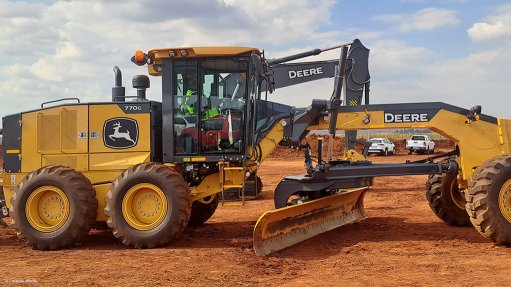Agriculture in Africa, what does the future look like?
This article has been supplied as a media statement and is not written by Creamer Media. It may be available only for a limited time on this website.
Collaboration between government and private sector is crucial
The importance of agricultural growth in Africa was highlighted during World Food Day on 16th October that focuses on raising awareness of world hunger and food security. This day seeks to heighten public consciousness to issues of global food insecurity and strengthen solidarity in the struggle against hunger, malnutrition and poverty.
The African agricultural sector is set to experience exponential growth over the next decade, but only if the sector diversifies enough and continues to invest in the factors inhibiting growth in Africa such as structural, financial and infrastructural challenges. This is according to Omri Van Zyl, Head of Deloitte Africa Agricultural Unit (DAAU) & Deloitte Africa Agriculture Leader.
“Diversity is important for the growth of the agricultural sector as it allows for tapping into diverse global markets” says Van Zyl.
Africa is regarded as a key centre of agricultural production because of availability of arable land. But van Zyl points out that to tap into potential, the sector has to invest in infrastructure, most notably storage infrastructure through grain silos and related infrastructure.
In Ethiopia, agriculture and the agri-industry will benefit from the movement of subsistence farmers into the commercial economy, helped by the expansion of road, power and market networks. In Central Africa, agriculture, fishery and forestry present increasing economic potential.
Agriculture remains the dominant sector in Africa, even though its contribution has fallen from 56% to 46% since the 1980s, but the composition of its output has changed as dramatically as its value has increased. The improvement in agricultural output is due to better use of arable land and improvements in productivity, for which there is still room for more. This suggests that agriculture still has huge potential.
A challenge though is the lack of capital to produce inputs which, not only affects quality of seed but also the quantity and quality of fertilizer applied per hectare. Studies indicate that the amount of fertilizer application in Africa can be as little as 25 kilograms per hectare, which has no beneficial effect whatsoever. The normal application amount is anything between 250 and 350 kilograms per hectare.
Changes in the composition of agricultural output are also reflected in the pattern of exports, which has seen the emergence of totally new categories in the top ten goods. For example, exports of cut flowers and fresh vegetables were practically non-existent in 2003 but figured in the top five exports by 2012.
“Climatic conditions and the availability of quality arable land favour agricultural development in products such as cotton, coffee, tobacco, yams, maize, bananas and cassava. The Southern African hub is well-endowed in a variety of natural resources on the other hand”, said van Zyl.
Increasing world populations and emerging markets will create a bigger demand for food production. Changing consumer demand is more focussed on meat and other proteins. This in turn will affect the demand for commodities used in the feed industry.
In addition, due to lack of chemical nutrients, farmers are forced to de-bush new tracks of land to obtain nutritious soils. This leads to deforestation and erosion which, makes farming unsustainable in the long term.
Due to the fact that the private sector is the initiator of commercial enterprises and as such the main stimulus of agriculture, it only makes business sense for government and private sector to partner and collaborate in ensuring that the industry is well supported. Focus should be on value chain activities whereby infrastructure, including road, rail and storage infrastructure, in established financial institutions will gain the necessary comfort to enter into financing agreements with primary producers who are assisted by industry leaders.
An interesting trend is that mining in Africa has been growing at an exponential rate and this creates the opportunity for agri-businesses to grow accordingly – a new approach should be considered whereby agri hubs are included in mining development plans. This is not only to create a stable source of nutrition, but will serve as the establishment of commercial agriculture that can be replicated through contract growing schemes. This can be an ideal development tool.
Mining and agriculture is more closely related to one another than one thinks. The reason is that both depend on long term tenure, are highly capital intensive and are reliant on each other’s outputs. Agriculture receives fertiliser from mining and mining receives food from the agriculture sector.
“Using technology and innovation for food security and sustainable development is one way of making certain that the food produced is secure for consumers. The use of modern technology, like seed varieties, herbicides and pesticides is able to increase agricultural production without using any genetically modified crops, “continues van Zyl.
It is encouraging to see private entities working alongside large multi-national companies as subsidiaries which, have resulted in a large portion of innovations being imported and adapted to suit the African agriculture market and conditions.
With Africa seen as one of the world’s fastest growing economic hubs, meeting the demand for key infrastructure across its many levels has been identified as a priority.
Deloitte – Manufacturing
Media contact:
Inga Sebata
Magna Carta (PR)
+27(0) 11 784-2598
Email address :inga@magna-carta.co.za
Annelle Botha
PR Manager
Deloitte & Touche
Tel: +27 (0)11 517-4552
anbotha@deloitte.co.za
Click here to visit the Deloitte Press Office
About Deloitte
Deloitte refers to one or more of Deloitte Touche Tohmatsu Limited, a UK private company limited by guarantee, and its network of member firms, each of which is a legally separate and independent entity. Please see www.deloitte.com/about for a detailed description of the legal structure of Deloitte Touche Tohmatsu Limited and its member firms.
Deloitte provides audit, tax, consulting and financial advisory services to public and private clients spanning multiple industries. With a globally connected network of member firms in more than 150 countries, Deloitte brings world-class capabilities and high-quality service to clients, delivering the insights they need to address their most complex business challenges. The more than 200 000 professionals of Deloitte are committed to becoming the standard of excellence.
This communication contains general information only, and none of Deloitte Touche Tohmatsu Limited, its member firms, or their related entities (collectively, the “Deloitte Network”) is, by means of this communication, rendering professional advice or services. No entity in the Deloitte Network shall be responsible for any loss whatsoever sustained by any person who relies on this communication.
? 2014 Deloitte & Touche. All rights reserved. Member of Deloitte Touche Tohmatsu Limited
Comments
Press Office
Announcements
What's On
Subscribe to improve your user experience...
Option 1 (equivalent of R125 a month):
Receive a weekly copy of Creamer Media's Engineering News & Mining Weekly magazine
(print copy for those in South Africa and e-magazine for those outside of South Africa)
Receive daily email newsletters
Access to full search results
Access archive of magazine back copies
Access to Projects in Progress
Access to ONE Research Report of your choice in PDF format
Option 2 (equivalent of R375 a month):
All benefits from Option 1
PLUS
Access to Creamer Media's Research Channel Africa for ALL Research Reports, in PDF format, on various industrial and mining sectors
including Electricity; Water; Energy Transition; Hydrogen; Roads, Rail and Ports; Coal; Gold; Platinum; Battery Metals; etc.
Already a subscriber?
Forgotten your password?
Receive weekly copy of Creamer Media's Engineering News & Mining Weekly magazine (print copy for those in South Africa and e-magazine for those outside of South Africa)
➕
Recieve daily email newsletters
➕
Access to full search results
➕
Access archive of magazine back copies
➕
Access to Projects in Progress
➕
Access to ONE Research Report of your choice in PDF format
RESEARCH CHANNEL AFRICA
R4500 (equivalent of R375 a month)
SUBSCRIBEAll benefits from Option 1
➕
Access to Creamer Media's Research Channel Africa for ALL Research Reports on various industrial and mining sectors, in PDF format, including on:
Electricity
➕
Water
➕
Energy Transition
➕
Hydrogen
➕
Roads, Rail and Ports
➕
Coal
➕
Gold
➕
Platinum
➕
Battery Metals
➕
etc.
Receive all benefits from Option 1 or Option 2 delivered to numerous people at your company
➕
Multiple User names and Passwords for simultaneous log-ins
➕
Intranet integration access to all in your organisation


















